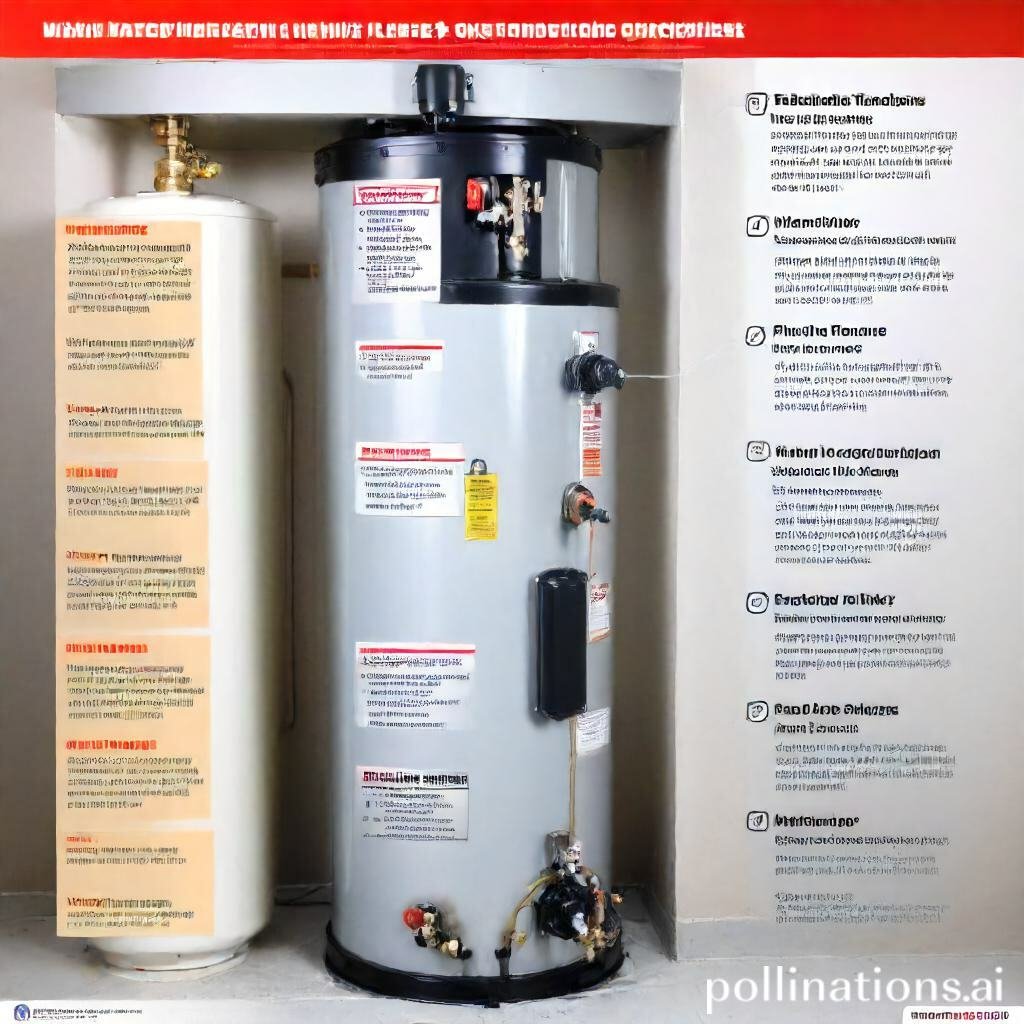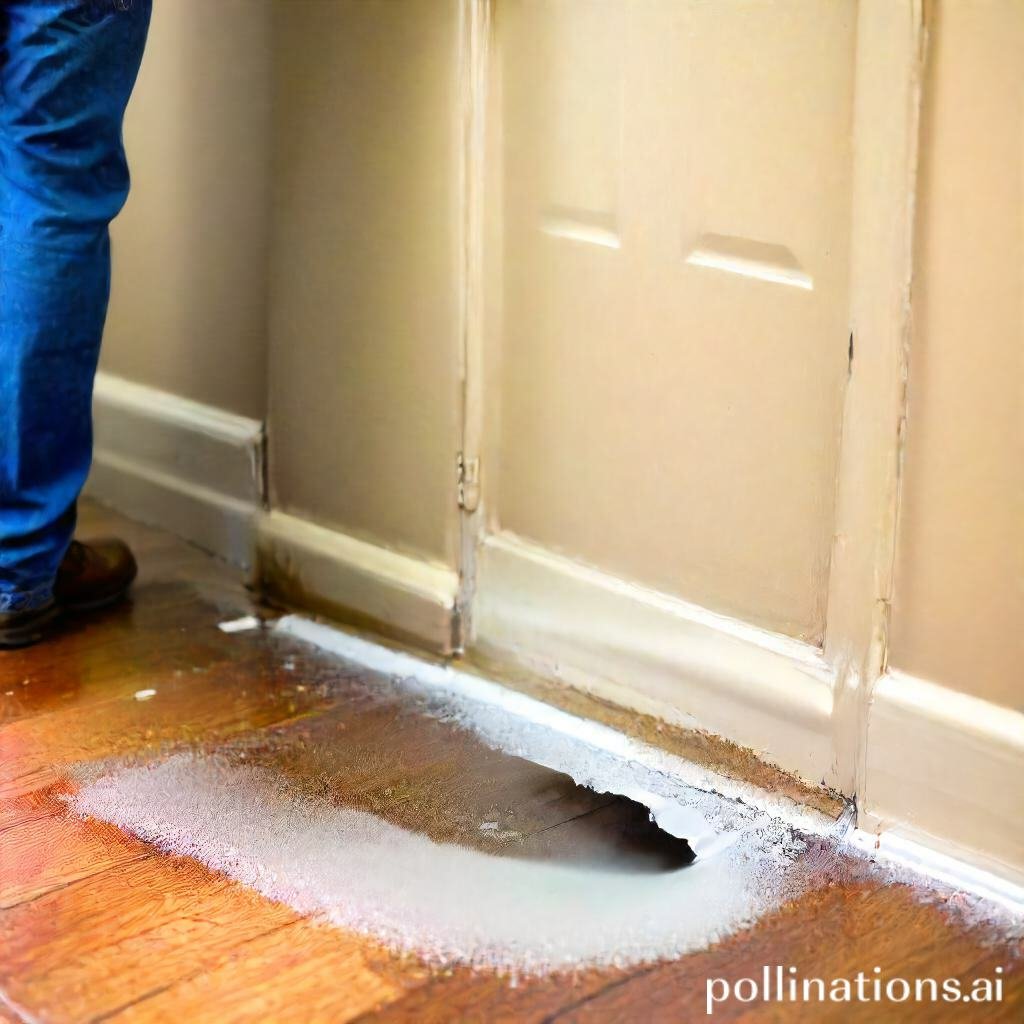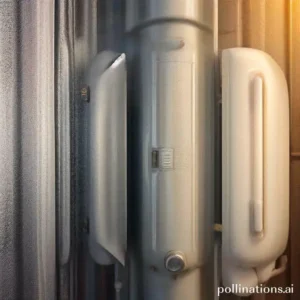
II. The water heater leak maintenance checklist should include inspecting the pressure relief valve, checking the temperature and pressure settings, examining the anode rod, and examining the tank for any signs of corrosion or damage.
III. By following a regular maintenance schedule and addressing any issues promptly, homeowners can avoid costly repairs and potential water damage to their homes.
Proper maintenance of your water heater is essential to prevent leaks and ensure its longevity. In this article, we will provide you with a helpful checklist to keep your water heater in optimal condition.
From checking for signs of leaks to flushing out sediment buildup, these maintenance tasks are simple yet crucial for the smooth functioning of your water heater. By maintaining this checklist regularly, you can avoid costly repairs and enjoy a reliable supply of hot water.
Let’s get started!
Signs of a Water Heater Leak
A water heater leak can cause significant damage to your home if not detected and addressed promptly. It is essential to be aware of the signs that indicate a potential water heater leak, so you can take immediate action to prevent further issues. Here are some common signs to look out for:
1. Visible water around the tank
If you notice water pooling around the base of your water heater tank, it is a clear indication of a leak. This could be due to a faulty valve or a crack in the tank itself. It is crucial to address this issue promptly to prevent water damage and potential mold growth.
2. Strange noises coming from the tank
Unusual noises such as popping, rumbling, or hissing coming from your water heater can indicate a leak. These noises may be caused by sediment buildup or a malfunctioning component. Ignoring these sounds can lead to further damage and potentially expensive repairs.
3. Decreased hot water supply
If you suddenly experience a decrease in hot water supply, it could be a sign of a water heater leak. A leak can disrupt the heating process, resulting in insufficient hot water for your daily needs. Addressing this issue promptly can help restore the proper functioning of your water heater.
4. Rusty or discolored water
If you notice rusty or discolored water when using hot water, it indicates a potential water heater leak. The presence of rust or sediment in the water could be a sign of corrosion inside the tank or pipes. It is crucial to investigate and resolve the issue to ensure your water is safe for use.
5. Strange odors coming from the tank
Unpleasant odors, such as a rotten egg smell, coming from your water heater can indicate a leak. This odor is often caused by bacteria reacting with the metal components inside the tank. Ignoring this issue can lead to further deterioration of the tank and potential health hazards.
It is essential to address any signs of a water heater leak promptly to prevent further damage and ensure the efficient functioning of your water heater. If you notice any of these signs, it is recommended to contact a professional plumber who can diagnose and fix the issue.
| Signs of a Water Heater Leak |
|---|
| Visible water around the tank |
| Strange noises coming from the tank |
| Decreased hot water supply |
| Rusty or discolored water |
| Strange odors coming from the tank |
Causes of Water Heater Leaks
Water heater leaks can be caused by various factors. Integral to identify the cause in order to address the issue effectively and prevent further damage. The following are some common causes of water heater leaks:
Sediment buildup
Over time, sediments can accumulate at the bottom of the water heater tank. These sediments can cause corrosion and lead to leaks. Regular maintenance, such as flushing the tank to remove sediments, can help prevent this issue.
Corrosion of the tank or pipes
Corrosion is a common problem that can cause water heater leaks. The tank or pipes may corrode due to the water’s chemical composition or other factors. Inspecting the tank and pipes regularly can help identify corrosion early on and prevent leaks.
High water pressure
Excessive water pressure can put strain on the water heater and its components, leading to leaks. Pivotal to ensure that the water pressure is within the recommended range. Installing a pressure regulator can help control water pressure and prevent leaks.
Loose or damaged fittings
If the fittings connecting the water heater to the plumbing system are loose or damaged, it can result in leaks. Regularly checking and tightening the fittings can help prevent leaks caused by this issue.
Age of the water heater
As water heaters age, they become more prone to leaks. The wear and tear over time can weaken the tank and its components, increasing the likelihood of leaks. Regular maintenance and considering replacing an old water heater can help prevent leaks.
Prevention Tips
In order to maintain the efficiency and longevity of your water heater, integral to take preventive measures. By observing these tips, you can ensure that your water heater functions optimally:
Regular Flushing to Remove Sediment Buildup
Sediment buildup can occur over time and affect the performance of your water heater. Flushing your water heater regularly helps remove this sediment, preventing clogs and improving efficiency.
Installation of a Pressure Regulator
A pressure regulator helps control the water pressure entering your water heater. High water pressure can cause damage to the heater and other plumbing fixtures. Installing a pressure regulator ensures that the water pressure remains at an optimal level, prolonging the life of your water heater.
Inspection of Fittings and Pipes
Regularly inspecting the fittings and pipes connected to your water heater is crucial. Leaks or loose fittings can lead to water damage and inefficiency. By checking for any signs of leaks or corrosion, you can address these issues promptly and prevent further damage.
Replacement of an Old Water Heater
If your water heater is outdated or showing signs of wear and tear, it may be time for a replacement. Older water heaters are less energy-efficient and more prone to issues. Upgrading to a newer model will not only improve performance but also save you money on energy bills.
Professional Maintenance Services
Engaging the services of a professional for regular water heater maintenance is highly recommended. Professionals have the expertise to identify and address any potential problems before they escalate. Regular maintenance can extend the lifespan of your water heater and ensure it operates smoothly.

Steps to Take When You Detect a Leak
1. Shut off the power supply or gas valve
When you detect a leak, the first step you should take is to shut off the power supply or gas valve. This will help prevent any potential hazards or further damage.
2. Turn off the water supply
In addition to shutting off the power supply or gas valve, indispensable to also turn off the water supply. This will help stop the flow of water and prevent any additional leakage.
3. Drain the tank
Once you have shut off the power supply, gas valve, and water supply, the next step is to drain the tank. This can be done by opening the drain valve and allowing the water to empty out.
4. Inspect the tank and pipes for damage
After draining the tank, it is crucial to inspect both the tank and pipes for any signs of damage. Look for cracks, leaks, or any other issues that may need to be addressed.
5. Contact a professional for repairs or replacement
If you detect any damage or suspect that there may be a leak, essential to contact a professional for repairs or replacement. A qualified technician will be able to assess the situation and provide the necessary solutions.
| Step | Description |
|---|---|
| 1 | Shut off the power supply or gas valve |
| 2 | Turn off the water supply |
| 3 | Drain the tank |
| 4 | Inspect the tank and pipes for damage |
| 5 | Contact a professional for repairs or replacement |

DIY vs. Professional Repairs
Pros and Cons of DIY Repairs
As for repairing your ice cream machine, you may be tempted to take the do-it-yourself approach. There are certainly some advantages to tackling the repairs on your own. One of the main pros of DIY repairs is the potential cost savings. By fixing the machine yourself, you can avoid paying for professional services.
That being said, there are also several cons to consider. DIY repairs require a certain level of technical skill and knowledge. If you’re not familiar with the inner workings of ice cream machines, you could end up causing more harm than good. Additionally, DIY repairs may void any warranties or guarantees that you have on your machine.
Benefits of Hiring a Professional
At the same time DIY repairs may seem appealing, there are many benefits to hiring a professional for your ice cream machine repairs. First and foremost, professionals have the expertise and experience to diagnose and fix any issues with your machine accurately. They have the necessary tools and equipment to ensure a proper repair.
Furthermore, hiring a professional gives you peace of mind. You can trust that the repairs will be done correctly and efficiently, reducing the risk of future breakdowns. Professionals also provide warranties on their work, giving you added protection and assurance.
Cost Comparison
When considering DIY versus professional repairs, it’s crucial to evaluate the cost implications. Whilst DIY repairs may initially appear cheaper, they can end up costing you more in the long run. If you make a mistake during the repair process, you may need to spend additional money to fix the new problems that arise.
In contrast, professional repairs may have a higher upfront cost, but they offer long-term value. With professional repairs, you can expect a higher quality of workmanship, reducing the likelihood of recurring issues. Additionally, professionals can often source parts at lower prices, offsetting some of the initial costs.
| Repair Method | Pros | Cons |
|---|---|---|
| DIY Repairs | – Potential cost savings | – Requires technical skill and knowledge – May void warranties |
| Professional Repairs | – Expertise and experience – Proper tools and equipment – Peace of mind – Warranties on work |
– Higher upfront cost |
Bottom Line
Regular maintenance of your water heater is crucial to prevent leaks and ensure its longevity. A leaky water heater can cause significant damage to your home and lead to costly repairs. By observing a simple maintenance checklist, you can identify and fix any potential issues before they become major problems.
Remember to check the temperature and pressure relief valve, drain the tank, inspect the anode rod, and check for any signs of corrosion or leaks. If you notice any issues, it’s best to call a professional plumber to address the problem. By taking these steps, you can ensure that your water heater is functioning properly and avoid any unexpected leaks or damage to your home.
Read More:
1. How To Identify And Fix Hidden Leaksin Water Heater
2. Water Heater Leaks And Health Risks
















